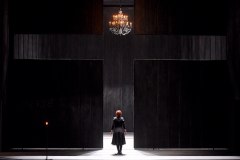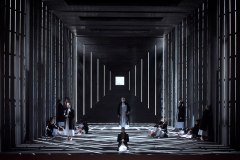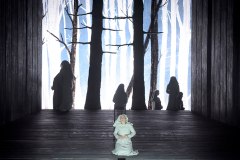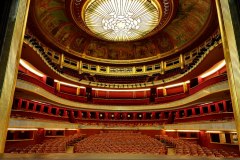Dialogues of the Carmelites
December 2024 | ||||||
|---|---|---|---|---|---|---|
Mo | Tu | We | Th | Fr | Sa | Su |
Based on a true story which took place during the Terror in France, this masterpiece by Francis Poulenc draws on a script by Georges Bernanos, who was in turn inspired by a short story penned by Gertrud von Le Fort. The work was a huge success when it was premiered at La Scala in January 1957, and in France at the Opéra Garnier six months later (notably due to the stage and vocal presence of Denise Duval and Régine Crespin). Making the mysteries of faith the subject of an opera dominated by female voices was nevertheless a risk, but the emotional power of Bernanos’s script, which Poulenc largely retained, the dramatic rigour, and the richness of the musical idiom make it one of the crowning achievements of twentieth-century French opera. In the Dialogues, Poulenc, who was both a deeply religious man and a modern composer, conveys the historic challenges of faith and mystery without denying their spiritual and physical torments: pride and humility, madness and contemplation, fear and self-sacrifice. Olivier Py’s staging remains true to this spirit, offering a timeless and moving vision of this twentieth-century masterpiece.
Some female singers will be returning for this new series of performances, but in different roles. Véronique Gens reprises Madame Lidoine, Patricia Petitbon will be Mère Marie de l’Incarnation, a role previously played by Sophie Koch who will now sing Madame de Croissy, whose extraordinary death scene on a suspended bed is etched in audiences’ memory. These original three singers from the premiere will be joined by Vannina Santoni (her first Blanche de la Force), Jodie Devos, and Alexandre Duhamel. American conductor Karina Canellakis will be at the rostrum with the musicians of Les Siècles for this reprise.
Synopsis
Place: Paris and Compiègne, 1789–94
Time: during the French Revolution
Act 1
The opera opens with Marquis and Chevalier de la Force talking about the general unrest in France and their worries about Blanche, at a time when crowds stop carriages in the street and aristocrats are attacked. The pathologically timid Blanche de la Force decides to retreat from the world and enter a Carmelite convent. The Mother Superior informs her that the Carmelite Order is not a refuge; it is the duty of the nuns to guard the Order, not the other way around. In the convent, the chatterbox Sister Constance tells Blanche (to her consternation) that she has had a dream that the two of them will die young together. The prioress, who is dying, commits Blanche to the care of Mother Marie. The Mother Superior passes away in great agony, shouting in her delirium that despite her long years of service to God, He has abandoned her. Blanche and Mother Marie, who witness her death, are shaken.
Act 2
Sister Constance remarks to Blanche that the prioress' death seemed unworthy of her, and speculates that she had been given the wrong death, as one might be given the wrong coat in a cloakroom. She said that perhaps someone else will find death surprisingly easy. Perhaps we die not for ourselves alone, but for each other.
Blanche's brother, the Chevalier de la Force, arrives to announce that their father thinks Blanche should withdraw from the convent, since she is not safe there (being both an aristocrat and the member of a religious community, at a time of anti-aristocracy and anti-clericalism in the rising revolutionary tides). Blanche refuses, saying that she has found happiness in the Carmelite Order. Later she admits to Mother Marie that it is fear (or the fear of fear itself, as the Chevalier expresses it) that keeps her from leaving.
The chaplain announces that he has been forbidden to preach (presumably for being a non-juror under the Civil Constitution of the Clergy). The nuns remark on how fear rules the country, and no one has the courage to stand up for the priests. Sister Constance asks, "Are there no men left to come to the aid of the country?" "When priests are lacking, martyrs are superabundant," replies the new Mother Superior. Mother Marie says that the Carmelites can save France by giving their lives, but the Mother Superior corrects her: it is not permitted to choose to become a martyr; God decides who will be martyred.
A police officer arrives and announces to the community that the Legislative Assembly has nationalized the convent and its property, and the nuns must give up their religious habits. When Mother Marie acquiesces, the officer taunts her for being eager to dress like everyone else. She replies that the nuns will continue to serve, no matter how they are dressed. "The people have no need of servants," proclaims the officer haughtily. "No, but they have a great need for martyrs," responds Mother Marie. "In times like these, death is nothing," he says. "Life is nothing," she answers, "when it is so debased."
Act 3
In the absence of the new prioress, Mother Marie proposes that the nuns take a vow of martyrdom. However, all must agree, or Mother Marie will not insist. A secret vote is held; there is one dissenting voice. Sister Constance declares that she was the dissenter, and that she has changed her mind, so the vow can proceed. Blanche runs away from the convent, and Mother Marie goes to look for her, finding her in her father's library. Her father has been guillotined, and Blanche has been forced to serve her former servants.
The nuns are all arrested and condemned to death, but Mother Marie is away at the time of the arrest. Upon receiving the news, the chaplain tells Mother Marie, when they meet again, that since God has chosen to spare her, she cannot voluntarily become a martyr by joining the others in prison.
At the place of execution, one nun after another stands and slowly processes toward the guillotine, as all sing the "Salve Regina" ("Hail, Holy Queen"). At the last moment, Blanche appears, to Constance's joy, to join her condemned sisters. Having seen all the other nuns executed, as she mounts the scaffold, Blanche sings the final stanza of the "Veni Creator Spiritus," "Deo Patri sit gloria...", the Catholic hymn traditionally used when taking vows in a religious community and offering one's life to God.
Program and cast
Sung in French, with French and English subtitles
Karina Canellakis | direction
Olivier Py | staging
Pierre-André Weitz | scenography and costumes
Bertrand Killy | lights
Patricia Petibon | Mère Marie de l’Incarnation
Vannina Santoni | Blanche de La Force
Véronique Gens | Madame Lidoine
Jodie Devos | Sœur Constance de Saint Denis
Sophie Koch | Madame de Croissy
Sahy Ratia | Le Chevalier de La Force
Alexandre Duhamel | Le Marquis de La Force
Marie Gautrot | Mère Jeanne de l’Enfant Jésus
Ramya Roy | Sœur Mathilde
Loïc Félix | Le Père confesseur du couvent
Blaise Rantoanina | Le premier commissaire
Yuri Kissin | Le second commissaire / Un officier
Matthieu Lécroart | Le geôlier / Monsieur Javelinot / Thierry
Les Siècles
Chœur Unikanti | direction Gaël Darchen
Théâtre des Champs-Élysées
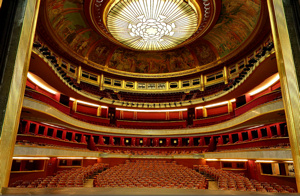
The Théâtre des Champs- Elysées is undoubtedly one of the finest venues in Paris . Built in 1913 , it has the distinction of having been designed by a group of artists architects Henry Van de Velde and Auguste Perret , the painter and sculptor Antoine Bourdelle , the painter Maurice Denis , and the crystal- René Lalique to do mention the main ones . He was the first Parisian theater to be built entirely of reinforced concrete.
Restoration of the Great Hall devoted to operatic performances , symphony concerts and dance was decided in 1985. Two years later , on 23 September 1987, the theater reopened its doors , completely renovated. Fifteen years after this important work it was decided to undertake a new renovation campaign , but to prevent the complete closure of the theater for an entire season , work is now carried by step during the summer . Then it is to replace aging equipment , to remedy wear certain parts of the theater and improve spectator comfort and artists during their visit . Thus in recent years, including the work involved the renovation of marble facade, replacing the carpet in the room with wooden floors , installation of a new fully decorated wooden concert to a significant improvement of acoustics, the orchestra pit and stage below .
The Théâtre des Champs- Elysées is now a modern working tool receiving each year nearly 300,000 spectators and a few thousands of artists and collaborators.
The Théâtre des Champs- Elysées , the jewel of French architecture of the twentieth century, was in 1953 one of the first buildings of contemporary architectural heritage to be classified as historic monuments . Since 1970 the Caisse des Dépôts owns the entire building 15 avenue Montaigne and principal patron of the theater.
For over a century, Théâtre des Champs-Elysées has been the place where the most celebrated artists have come to make their names in Paris. The world’s finest orchestras and world-class soloists have always been a fixture at the Theatre. Théâtre des Champs-Elysées presents more than 200 concerts each year and is renowned for its outstanding performances of all genres, from classical music concerts and staged opera to contemporary dance and jazz.
How to reach us:
Subway: Alma-Marceau (line 9), Franklin D.Roosevelt (line 1), Pont de l’Alma (RER line C)
Bus: n° 42, 63, 72, 80, 92
Taxi station: Place de l’Alma, corner of avenue George V
Car park: Alma George V. The entrance is in front of n° 19, avenue George V
Fixed rate depending on the length of the performance. Payment upon entering.

 EN
EN DE
DE IT
IT FR
FR ES
ES RU
RU JP
JP RO
RO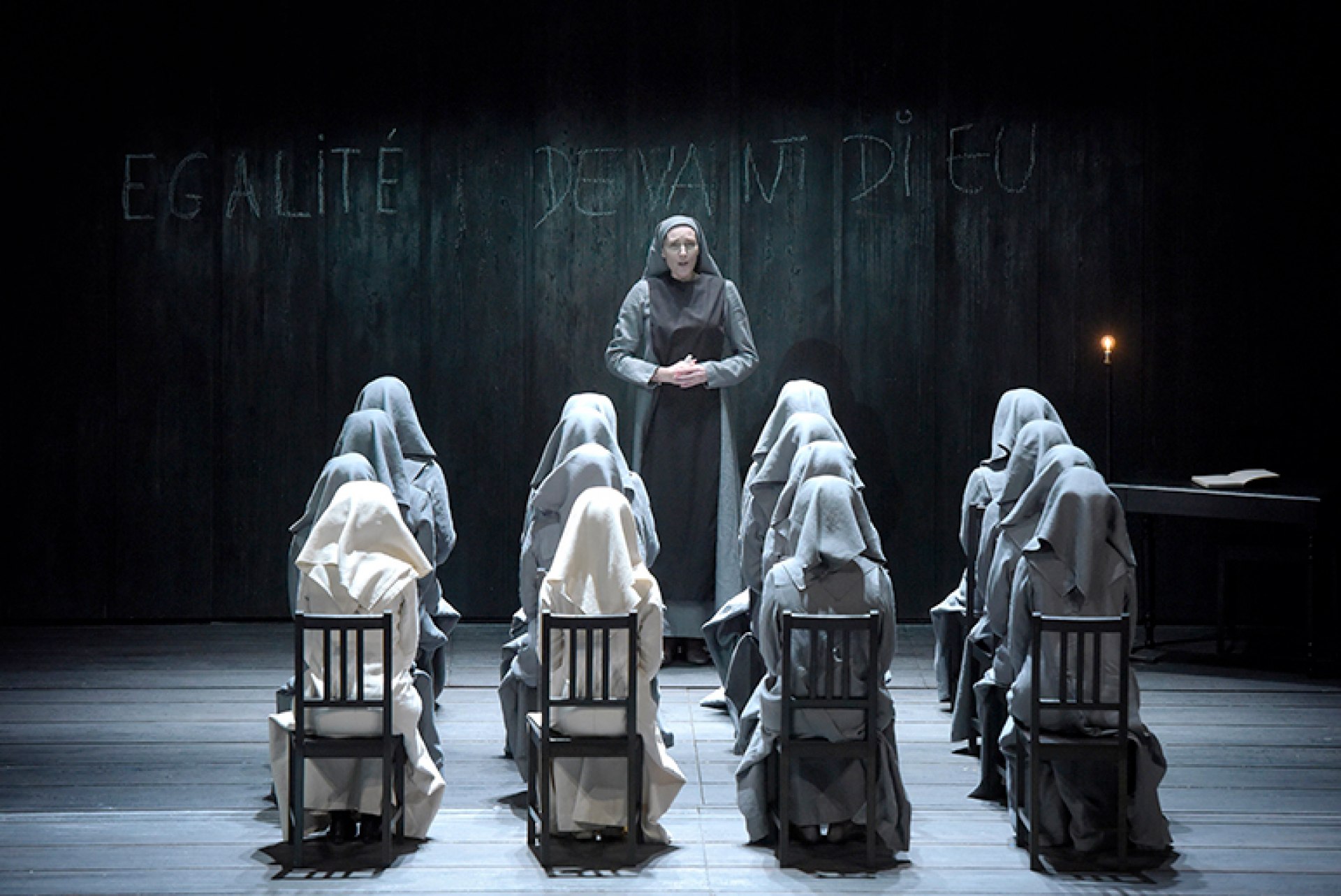
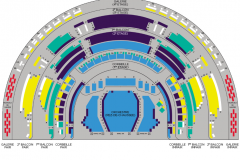 Seating plan
Seating plan 
